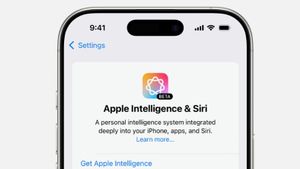JAKARTA - Fei-Fei Li, a prominent computer science expert, is building a startup that uses human-like visual data processing to create artificial intelligence (AI) capable of continuing reasoning in what would be a major leap for the technology.
Li, considered a pioneer in AI, managed to raise funding for the company in a recent preliminary funding round. Investors include venture capital firm Silicon Valley Andreessen Horowitz, said three sources, and Radical Ventures, a Canadian company he joined as a scientific partner last year, according to two other sources.
Spokesman for Andreessen Horowitz and Radical Ventures declined to comment on it. Li also did not provide a response to a request for comment.
Li is widely known as "mother of AI," a title derived from the term "fathers" which is often used to refer to the trio of researchers who won the top award in the world of computing, the Turing Award, in 2018 for their breakthroughs in AI technology.
In describing the startup, one of the sources pointed at Li's speech at a TED conference in Vancouver last month. At that time he said that the forefront of the study involved algorithms that could sensibly extrapolate how images and text would be seen in a three-dimensional environment and act based on those predictions, using a concept called "spatial intelligence."
To illustrate the idea, he showed a picture of a cat with his hand stretched, pushing the glass towards the edge of the table. In an instant, he said, the human brain could assess "the geometry of this glass, its place in 3D space, its relation to tables, cats, and everything else," then predict what would happen and take action to prevent it.
"Alam has created a good cycle of seeing and performing, supported by spatial intelligence," Li said.
The lab itself at Stanford University is trying to teach computers "how to act in the 3D world," he added, for example, by using a large language model to gain robotic arms to perform tasks such as opening doors and making sandwiches in response to verbal instructions.
Li got his name in the AI field by developing a large-scale image data collection called ImageNet which helps introduce a generation of computer vision technologies that can identify objects reliably for the first time.
He co-leaded the Human-Based AI Institute at Stanford, which focuses on developing AI technology in ways that "enhanced human conditions." In addition to his academic work, Li leads AI in Google Cloud from 2017 to 2018, becomes a member of Twitter's board of directors, and performs assignments as policy advisors, including the White House.
Li has lamented funding gaps in AI research between competitive private sectors both on the one hand and academics and government laboratories on the other, calling for the US government's "mentality moonshot" to invest in scientific applications of the technology and research into its risks.
SEE ALSO:
His Stanford profile states that he took part leave from early 2024 to late 2025. Among the research interests listed on his profile are "AI inspired cognitive," computer vision, and robotic learning.
On LinkedIn, he lists the current work as "newbie" and "something new," starting in January 2024.
By jumping into the world of startups, Li joins the race among the hottest AI companies to teach their algorithms a common sense to address today's technological limitations such as big language models, which tend to issue unreasonable lies in the midst of an otherwise stunning human-like response.
Many say that this ability to "thinking" should be built before the AI model can achieve common artificial intelligence, or AGI, which refers to a threshold where the system can perform most of its tasks properly or more capable than humans.
Some researchers believe they can improve reasoning by building bigger and more sophisticated versions of current models, while others argue that the way forward involves the use of a new "world" model that can absorb visual information from the physical environment around them to develop logic, replicate the way infants learn.
The English, Chinese, Japanese, Arabic, and French versions are automatically generated by the AI. So there may still be inaccuracies in translating, please always see Indonesian as our main language. (system supported by DigitalSiber.id)


















